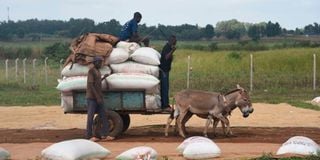Premium
Embu, Kirinyaga donkey owners say lifting of slaughter ban spells doom

Donkey owners in Kirinyaga and Embu counties have expressed fears that their source of livelihood may again be at risk following a court ruling that quashed the ban on the slaughter of the animals.
Donkey owners in Kirinyaga and Embu counties have expressed fears that their source of livelihood may again be at risk following a court ruling that quashed the ban on the slaughter of the animals.
They noted that during the one year that the four donkey abattoirs remained closed, the population of the animals increased, creating jobs for many.
Last week, a Naivasha court quashed the Legal Notice 63 of 2020 that had since March 31 last year revoked the declaration of Star Brilliant Limited, Goldox (K) Limited, Silzha Limited and Fuhai Machakos Trading Company Limited as export slaughterhouses for donkeys.
Justice Richard Mwongo observed that the government, through the office of the Attorney-General and the Department of Veterinary Services, had not sufficiently defended its case.
He thus prohibited the Agriculture Cabinet Secretary Peter Munya and his agents from enforcing the notice.
Appeal ruling
The turn of events has worried farmers who are now calling on the government to move fast and appeal the ruling.
Kirinyaga Donkey Owners Association Chairman Cyrus Gitonga said the abattoirs slaughtered hundreds of donkeys daily, raising demand for the animals.
He noted the high demand made thieves to steal donkeys from the region and sold them to unscrupulous merchants who slaughtered them for sale.
“For the period the abattoirs have remained closed, we have not had a single incidence of donkey theft. In contrast, when they were operating, we were losing several donkeys every week. These thefts were reported to police stations,” he said.
Mr Gitonga pointed out that donkeys play a crucial role in the country, hauling heavy loads in areas where motorable transport is unavailable, adding that the animals provide employment for many people.
A donkey owner from Mbeere South, Mr John Kithu, narrated how he and his colleagues had lost their beast of burden to thieves.
“Our donkeys used to be stolen at night and sold to unscrupulous butchers outside Embu region. The situation was bad and the ban should have remained in force," he said.
Roll back gains
Kahuruko Youth Donkey Users Chairman Dennis Muchira said the ruling may roll back the gains achieved in the short period the abattoirs were shut.
“Even our calving donkeys used to be stolen a few years ago. Since last year when incidents of theft reduced, we have bred our productive donkeys leading to their rise in population,” he said.
Peter Murimi, a veterinary officer in Mwea, called on the government to take measures to protect the donkey population from diminishing as that would render many people jobless.
He also called for the rolling out of breeding programmes to increase the number of donkeys in the country.
Mr Ephantus Njeru, however, holds the view that the slaughterhouses can continue operating, but with measures in place to trace the origins of the donkeys slaughtered there so that stolen animals are not supplied to them.
Demand for donkey skin and meat is on the rise especially in China where they are used to produce anti-ageing products and traditional a medicine known as ejiao.
Brooke East Africa, a donkey advocacy group, estimates that at least 1,000 donkeys were being slaughtered each day in Kenya when the four slaughterhouses were operational.
Kenya has about 1.2 million donkeys compared to 1.8 million a decade ago, according to government data published last year.





